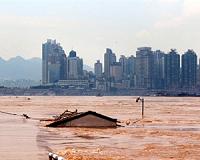 |
Cairo (AFP) Sept 21, 2010 As world experts grapple with ways to contain global warming, researchers gathered in Egypt are seeking answers from the country's pharaonic past to help tackle environmental problems of the present. Blessed with incomparable archaeological wealth, Egypt is the most populous Arab nation and the number of inhabitants is expected to more than double by 2050 to 160 million, according to estimates. The effects of climate change have long been neglected in this large North African country which largely depends on the fertile Nile Delta to feed its growing population amid concerns about land erosion. A three-day conference opened on Sunday with experts hoping to understand how the ancient Egyptians, who were capable of erecting the famous Giza pyramids, dealt with climate change. "It's time we try to learn from the past so as to make better decisions for our future," said Shawkat Yahia, a researcher from the prestigious American University in Cairo. He told the conference that answers were needed quickly, noting that the lives of millions of people are at risk if precious arable land disappears. "By understanding more about how societies adapted to... their environment, we would be better prepared to plan and adapt to the current as well as the future challenges that face the Nile Delta," he said. Yahia is among some 200 archaeologists, geographers, historians, geologists and palaeontologists from 25 countries who hope geoarchaeology -- the union between archaeology and geology -- will provide the key. The conference is the first of its kind to be held in Egypt, where archaeology has always taken a rigid and classical approach to understanding the past. "Traditional Egyptology must adapt to new approaches... (such as how) to reconstitute the environment in which people evolved," said Yann Tristant, of the French Institute of Oriental Archaeology (IFAO). The IFAO has joined forces with France's national research centre CNRS and Egypt's Supreme Council of Antiquities to create a platform for brainstorming that could help experts find solutions for the future. Participants in the symposium have drawn up papers on a wealth of subjects ranging from pharaonic military campaigns to the patina known as "desert varnish" which forms a thin hard layer on the soil's surface. The goal of their discussions is to unearth archaeological and geological evidence that may explain how the ancients survived climate change -- and what lessons can be drawn from it. CNRS experts Pierre Zignani and Matthieu Ghilardi believe that much can be learned from the architects who designed the centuries-old temples that have withstood the ravages of time. "Heavy rainfall because of climate changes well attested over the last millennia and major flood events from the Nile River were also integrated by the architects when building the religious structures," they said in a joint paper. Researching the past "may provide information beyond our current fundamental knowledge and offer new critical information to our community." Mahmoud Abdel Moneim of Egypt's Ain Shams University, in a paper prepared for the conference, wondered whether the head of the Great Sphinx could even come tumbling down because of climate change "during the present century." "The rate of the weathering of the Sphinx is calculated at 0.066 millimetres per year," he said of the enigmatic half-lion, half-man statue which towers over the desert in the Giza pyramid complex.
Share This Article With Planet Earth
Related Links Climate Science News - Modeling, Mitigation Adaptation
 Avoiding Dangerous Climate Change: An International Perspective
Avoiding Dangerous Climate Change: An International PerspectiveBoulder CO (SPX) Sep 21, 2010 The world will need to make substantial reductions in greenhouse gas emissions below current levels over the next few decades if the worst impacts of dangerous climate change are to be avoided. This was a key conclusion from UK and US climate scientists at an international workshop on the UK AVOID program in Washington, DC exploring the most policy-relevant aspects of understanding dangero ... read more |
|
| The content herein, unless otherwise known to be public domain, are Copyright 1995-2010 - SpaceDaily. AFP and UPI Wire Stories are copyright Agence France-Presse and United Press International. ESA Portal Reports are copyright European Space Agency. All NASA sourced material is public domain. Additional copyrights may apply in whole or part to other bona fide parties. Advertising does not imply endorsement,agreement or approval of any opinions, statements or information provided by SpaceDaily on any Web page published or hosted by SpaceDaily. Privacy Statement |